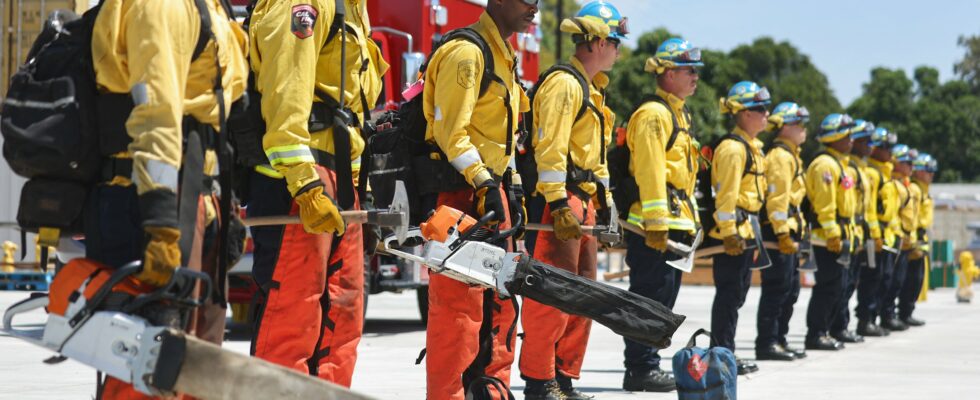Eleven people died, 10,000 buildings destroyed and more than 14,000 hectares reduced to smoke: this is the provisional assessment of the gigantic fires which have been ravaging Los Angeles, the second largest city in the United States, for several days. A disaster which underlines the lack of human resources to fight against the flames, the local firefighters having announced that at the height of the fire, they did not have sufficient personnel to contain the two main fronts which took over the city. pincers.
To help them, reinforcements were sent to the site, not without raising some controversy. Starting with groups of prisoners agreeing to go fight fires, in exchange for a reduced sentence, or even private firefighters hired by insurance companies – highlighting the inequalities between beneficiaries.
5 to 10 dollars per day
In California, among the thousands of federal, state and local firefighters currently active on the ground, there are approximately 800 prisoners responding as volunteers, the Department of Corrections and Rehabilitation (CDCR) tells the channel. ABC News. Distributed in 35 minimum security camps, called “fire camps”, they carry out prevention work throughout the year and participate directly in fighting fires alongside “Cal Fire”, the equivalent of the Civil Protection, when necessary.
But these teams raise questions: paid between $5.80 and $10.24 per day, with a bonus of one dollar per hour in the event of active intervention, the inmates accept this type of mission mainly because it is accompanied by a reduction in sentence, and less difficult detention conditions, while the Californian prison system is tested by overcrowding. “We had more freedom when we were incarcerated in this type of camp, we were outside the walls of a prison, we went out among people and nature during the day. There were no armed guards around of us”, says on TikTok Matthew Hahn, a former prisoner who participated in this program.
A patch deemed “crucial”, while Los Angeles firefighters denounce budget cuts affecting their activities. In a memo in early December, Fire Chief Kristin Crowley said a $7 million reduction in overtime “severely limits the Department’s ability to prepare for, train for, and respond to large-scale emergencies “, and affected its ability to carry out brush clearing inspections and residential inspections, reports CBS News.
The booming private sector
Faced with a lack of public resources, the private firefighting sector is also expanding in California. Hired by insurance companies, these units carry out prevention actions and protect properties in the event of a disaster. They reinforce homes upstream of the danger, by pruning trees and removing combustible materials, then after the fires to prevent possible recurrences, without however participating directly in the fight against the flames.
These services are nevertheless expensive, ranging from several thousand to tens of thousands of dollars, and are sometimes only accessible to owners of property worth more than a million dollars, notes ABC News. Thus, in the midst of the disaster, the tweet of businessman Keith Wasserman, not hesitating to offer astronomical sums in exchange for the reinforcement of these teams, sparked an outcry on the web.
Understand what went wrong
Despite their role, these teams are also criticized for their lack of cooperation with state services. In an article published in 2018 in the media NBCChris Landry, the head of a California volunteer fire unit, testified as follows: “We don’t have common communication. I don’t know what field they are qualified in. I don’t know where they are, because I don’t does not supervise them. They report to the insurer.”
The fires currently ravaging parts of California could become the costliest on record, with losses estimated between $135 billion and $150 billion by AccuWeather. As the fight against the flames continues, eyes are turning to the authorities, in particular the mayor of Los Angeles, Karen Bass, accused of having reduced the budget of the firefighters, at the same time that some insurers stopped renewing thousands of contracts deemed too expensive, just before the fire season. Several investigations have been opened in order to understand the cause of the gigantic fires and their rapid spread, as well as the flaws in the emergency system.
